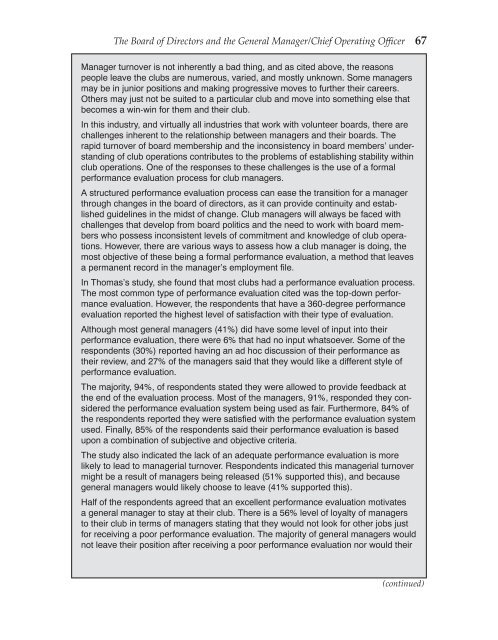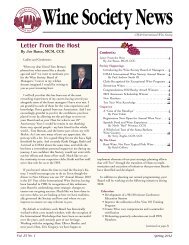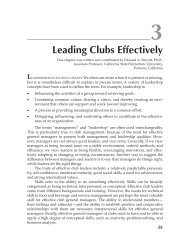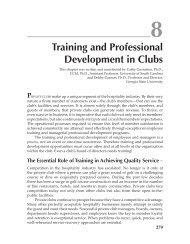The Board of Directors and the General Manager/Chief Operating ...
The Board of Directors and the General Manager/Chief Operating ...
The Board of Directors and the General Manager/Chief Operating ...
You also want an ePaper? Increase the reach of your titles
YUMPU automatically turns print PDFs into web optimized ePapers that Google loves.
<strong>The</strong> <strong>Board</strong> <strong>of</strong> <strong>Directors</strong> <strong>and</strong> <strong>the</strong> <strong>General</strong> <strong>Manager</strong>/<strong>Chief</strong> <strong>Operating</strong> Officer 67<strong>Manager</strong> turnover is not inherently a bad thing, <strong>and</strong> as cited above, <strong>the</strong> reasonspeople leave <strong>the</strong> clubs are numerous, varied, <strong>and</strong> mostly unknown. Some managersmay be in junior positions <strong>and</strong> making progressive moves to fur<strong>the</strong>r <strong>the</strong>ir careers.O<strong>the</strong>rs may just not be suited to a particular club <strong>and</strong> move into something else thatbecomes a win-win for <strong>the</strong>m <strong>and</strong> <strong>the</strong>ir club.In this industry, <strong>and</strong> virtually all industries that work with volunteer boards, <strong>the</strong>re arechallenges inherent to <strong>the</strong> relationship between managers <strong>and</strong> <strong>the</strong>ir boards. <strong>The</strong>rapid turnover <strong>of</strong> board membership <strong>and</strong> <strong>the</strong> inconsistency in board members’ underst<strong>and</strong>ing<strong>of</strong> club operations contributes to <strong>the</strong> problems <strong>of</strong> establishing stability withinclub operations. One <strong>of</strong> <strong>the</strong> responses to <strong>the</strong>se challenges is <strong>the</strong> use <strong>of</strong> a formalperformance evaluation process for club managers.A structured performance evaluation process can ease <strong>the</strong> transition for a managerthrough changes in <strong>the</strong> board <strong>of</strong> directors, as it can provide continuity <strong>and</strong> establishedguidelines in <strong>the</strong> midst <strong>of</strong> change. Club managers will always be faced withchallenges that develop from board politics <strong>and</strong> <strong>the</strong> need to work with board memberswho possess inconsistent levels <strong>of</strong> commitment <strong>and</strong> knowledge <strong>of</strong> club operations.However, <strong>the</strong>re are various ways to assess how a club manager is doing, <strong>the</strong>most objective <strong>of</strong> <strong>the</strong>se being a formal performance evaluation, a method that leavesa permanent record in <strong>the</strong> manager’s employment file.In Thomas’s study, she found that most clubs had a performance evaluation process.<strong>The</strong> most common type <strong>of</strong> performance evaluation cited was <strong>the</strong> top-down performanceevaluation. However, <strong>the</strong> respondents that have a 360-degree performanceevaluation reported <strong>the</strong> highest level <strong>of</strong> satisfaction with <strong>the</strong>ir type <strong>of</strong> evaluation.Although most general managers (41%) did have some level <strong>of</strong> input into <strong>the</strong>irperformance evaluation, <strong>the</strong>re were 6% that had no input whatsoever. Some <strong>of</strong> <strong>the</strong>respondents (30%) reported having an ad hoc discussion <strong>of</strong> <strong>the</strong>ir performance as<strong>the</strong>ir review, <strong>and</strong> 27% <strong>of</strong> <strong>the</strong> managers said that <strong>the</strong>y would like a different style <strong>of</strong>performance evaluation.<strong>The</strong> majority, 94%, <strong>of</strong> respondents stated <strong>the</strong>y were allowed to provide feedback at<strong>the</strong> end <strong>of</strong> <strong>the</strong> evaluation process. Most <strong>of</strong> <strong>the</strong> managers, 91%, responded <strong>the</strong>y considered<strong>the</strong> performance evaluation system being used as fair. Fur<strong>the</strong>rmore, 84% <strong>of</strong><strong>the</strong> respondents reported <strong>the</strong>y were satisfied with <strong>the</strong> performance evaluation systemused. Finally, 85% <strong>of</strong> <strong>the</strong> respondents said <strong>the</strong>ir performance evaluation is basedupon a combination <strong>of</strong> subjective <strong>and</strong> objective criteria.<strong>The</strong> study also indicated <strong>the</strong> lack <strong>of</strong> an adequate performance evaluation is morelikely to lead to managerial turnover. Respondents indicated this managerial turnovermight be a result <strong>of</strong> managers being released (51% supported this), <strong>and</strong> becausegeneral managers would likely choose to leave (41% supported this).Half <strong>of</strong> <strong>the</strong> respondents agreed that an excellent performance evaluation motivatesa general manager to stay at <strong>the</strong>ir club. <strong>The</strong>re is a 56% level <strong>of</strong> loyalty <strong>of</strong> managersto <strong>the</strong>ir club in terms <strong>of</strong> managers stating that <strong>the</strong>y would not look for o<strong>the</strong>r jobs justfor receiving a poor performance evaluation. <strong>The</strong> majority <strong>of</strong> general managers wouldnot leave <strong>the</strong>ir position after receiving a poor performance evaluation nor would <strong>the</strong>ir(continued)
















